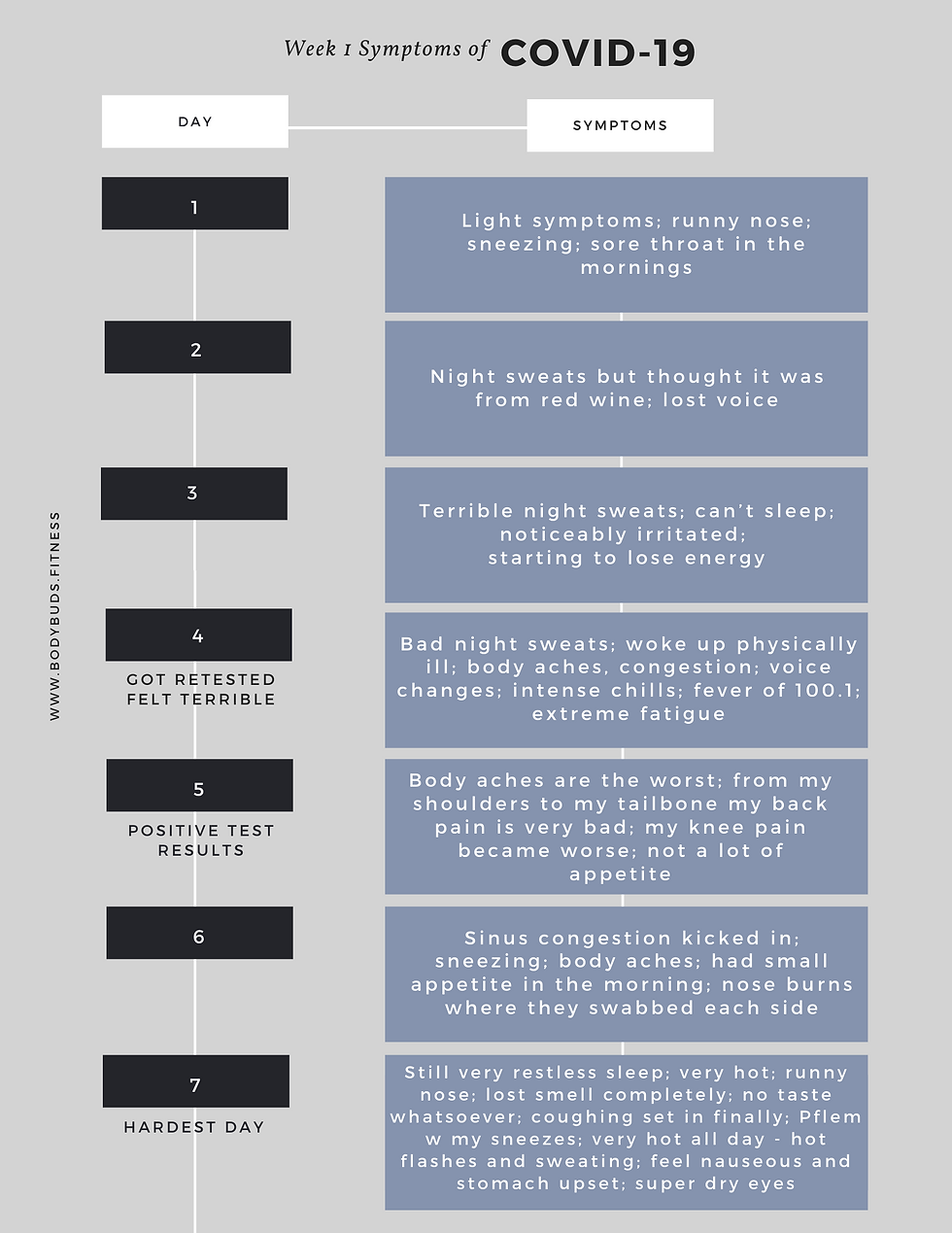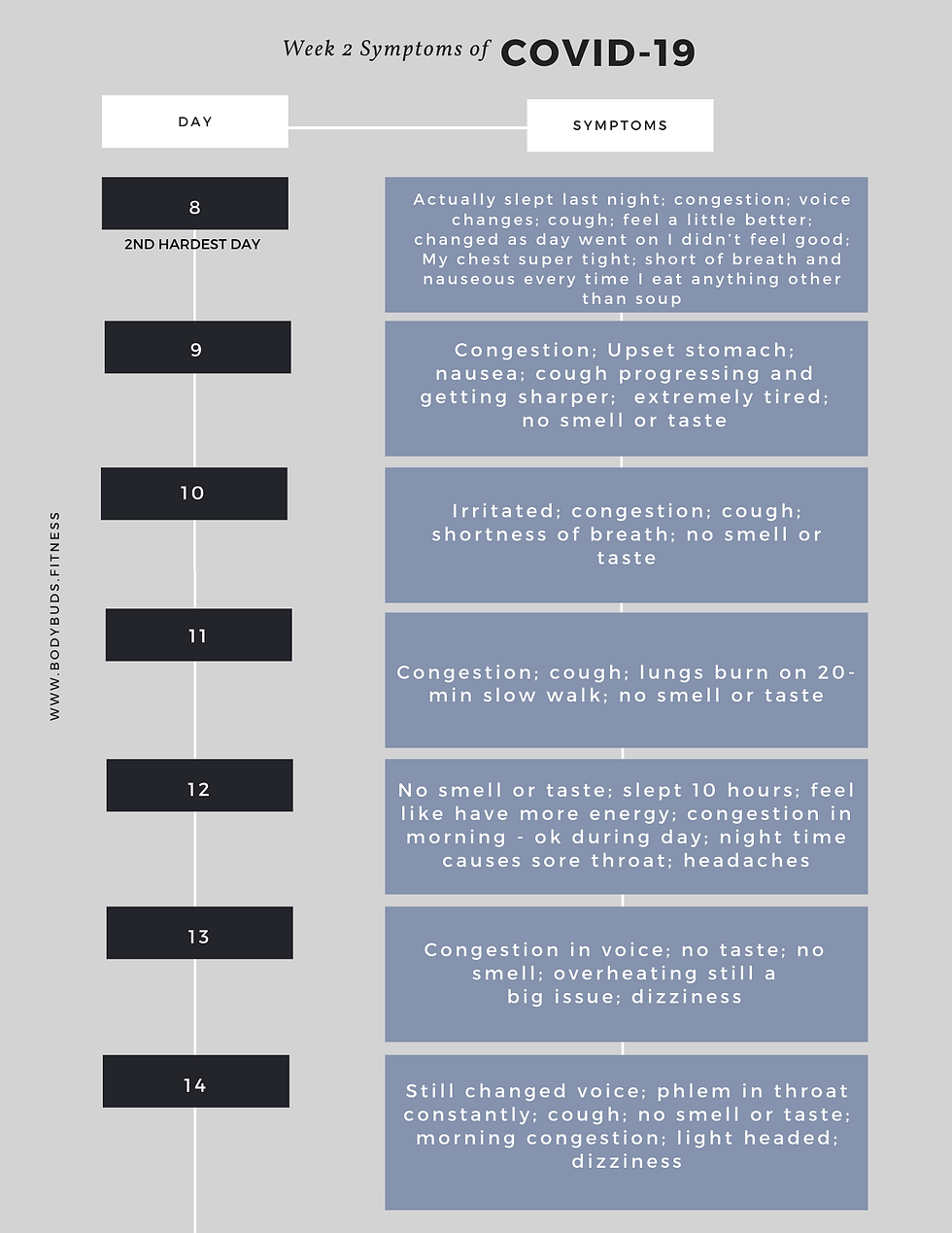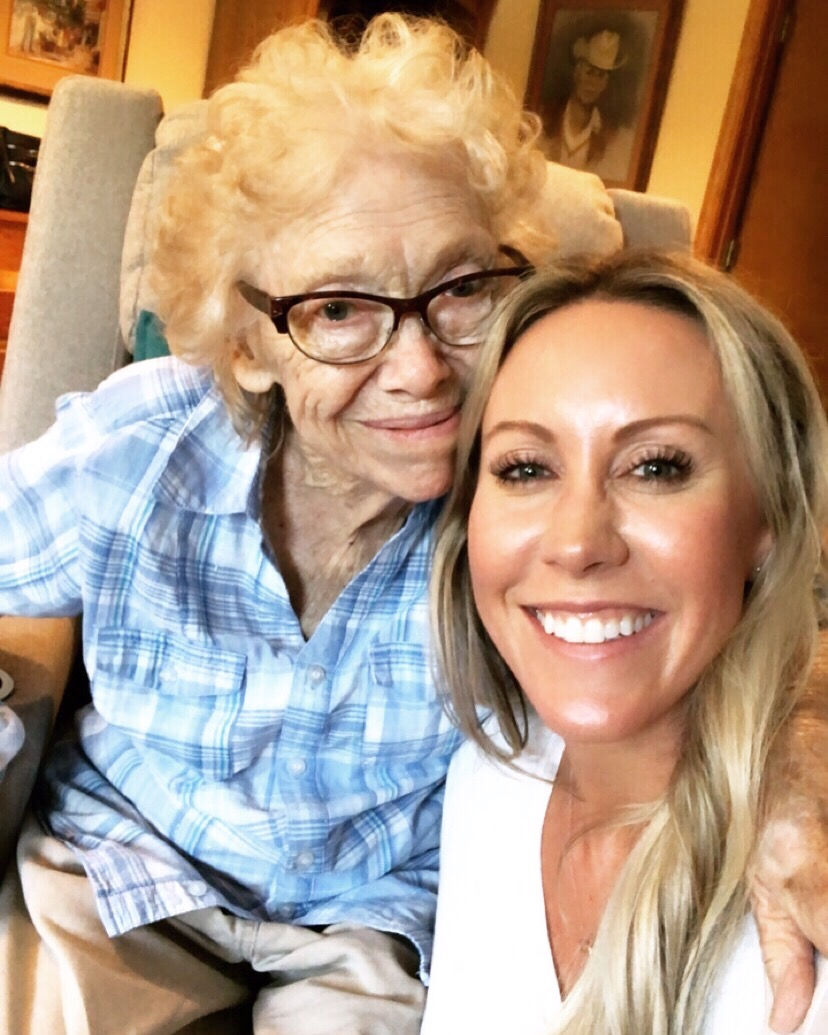- Brooke Budke

- Oct 4, 2020
- 6 min read
COVID-19 is like modern-day leprosy. You are highly contagious, no one wants to be around you, no one can touch you, and you are shut out and shunned from society.
Admittedly I am nervous to share this blog. COVID is an unspoken and recognized fear of millions of people across the world. The caution I took to not get exposed, the anxiety felt when dealing with it, and the trickiness of re-integration back into the world has been one of the most unique experiences of my life.

The purpose of this blog is simply to share one person's experience and symptoms of overcoming COVID-19. When I was in my contagion period I searched and searched for resources, yet found very little. The media sensationalizes it, the reporting is skewed and you feel very alone. So if you are caring for a loved one with COVID, experiencing symptoms yourself, or if you are curious about the day-to-day advancement of the virus, this blog is for you.
Pre-COVID
Let me start by sharing that our family follows rules. We believe in being part of the solution for the greater good. In fact, in the early months of COVID, when very few people wore masks, my husband Tray said, "we are leaders in our community, we need to set an example and wear our masks." At first, if you remember back to March at the beginning of this all, it was "weird" to wear a mask. People without them looked at people with a mask like, "come on man". But still, we wore our masks, sanitized, washed, cleaned and stayed six feet apart. The girls (16 and 14) didn't love us for this decision. Then schools and businesses shut down and we homeschooled and worked-from-home March through May. Everyone at that point quarantined to flatten the curve. Then, as businesses began opening everyone made decisions on their re-integration into society based on their comfort level, and their level of risk. Summer was hard on the girls with their yearning to see their friends and be normal teenagers. It was especially hard on adults too working from home and managing school, kids, work, pets and more. We face-timed with friends and set up zoom happy hours. I completely understood the girl's heartache over missing their friend groups because we did too. Human beings are meant to be together and many people's anxiety and depression rose during the quarantine. Thankfully, we decided as a family that our summer focus would be "making memories" and we began to make a list of all the fun things we could do that would still keep us safe. For seven months we kept our distance, limited social interaction to only our immediate family, still wearing masks around family, and sitting outside on driveways. We did everything we could to avoid getting it and increase our health. And yet, COVID made its way into our house and infected us all.
COVID exposure
No one is ever really sure where you originally get exposed to COVID, yet once you do, it likely will make its way through each person in the family. My husband Tray got it first. His symptoms started showing up on August 21. He has chronic allergies and he was sure this was fall allergies coming in early. For eight days he took meds and had classic sinus infection symptoms. We might not have ever got him tested until we learned a family member tested positive. So both he and I went to get tested on August 28. The test was not as bad as I imagined. The anxiety of the long cotton swab is real though. We were sitting together in the urgent care room when the nurse said "who wants to go first?" Well, that question didn't give me a whole lot of reassurance. Tray volunteered but then I immediately thought there's no way I want to see him in pain and then wait to get mine second. So I said me first, me first! He kindly let me go first. I put my head against the back wall for support and in the long cotton swab went. I thought it went up the nasal cavity but it goes straight back, like basically to the back of your skull. You instinctively cough and squirm and they have to hold it for a sloooooow count of three seconds. They are a long three seconds. Then, just like that, it's over. We were told to quarantine since we had been directly exposed and the next day we got our results. Tray's was positive and mine was negative. I was relieved and also faced a new challenge—taking care of my husband without getting the virus myself. That, as we know, was not the outcome I ended up with.
COVID Symptoms
I tested positive for COVID exactly two weeks after Tray's first day of symptoms. I share this date to reiterate the importance of following the 14-day quarantine recommendations. Even if you are feeling fine, you might be carrying the virus. Monday, August 31 I started to get a runny nose and sneezing. By the middle of the week, I was experiencing high fatigue, irritability, and I started to lose my voice. I had been extremely hot every night that week in my sleep and on the morning of September 3rd, I woke up and felt terrible. I knew I needed to get re-tested. I kept track of my symptoms as they continued to progress and outlined them in the chart below. Save this to your phone or share it with someone who's going through it as a guide of what's to come. It's very important to note that my husband, two girls, and myself all had variations of symptoms. Tray's were allergy-focused, the girls had a handful of symptoms for a week to 10 days. Yet I seemed to experience almost all of the common symptoms, at a high degree, for a long period of time.


Non-COVID Side Effects
Even after two weeks of intense symptoms, the most alarming element of the virus is isolation. When you are contagious you must remain away from everyone and isolation is a very difficult experience. I am a vision board, affirmations, manifestion, gratitude journal kind of gal. My mindset and discipline are two of my best attributes. And still, it is very, very difficult to be sick, alone, and unable to get a hug, hold a hand or even sleep in the same bed as your spouse. My body aches were easily the most intense symptom I had. The two things I craved most—a back scratch and a hug—were off-limits.
When you are contagious you must remain away from everyone and isolation is a very difficult experience. I am a vision board, affirmations, manifestion, gratitude journal kind of gal. My mindset and discipline are two of my best attributes. And still, it is very, very difficult to be sick, alone, and unable to get a hug
Long COVID
I recently read an article about “long COVID”, which stated how the side effects of the virus lasted longer than expected. I felt relief knowing it wasn’t just me for how long my symptoms progressed. For more than four weeks I had congestion, a cough, and loss of smell and taste. It gave me great fear of re-integrating into our community as I still felt the urge to cough, sneeze, and couldn’t smell or taste. The loss of smell and taste dramatically impacts your appetite. I lost five pounds in the first two weeks and I had very little energy to do any kind of exercise. Today is October 4, exactly one month after my positive COVID test and I would rank myself at being 85% back to my usual self. I get very tired, have low stamina, and morning congestion every day. Be kind to yourself as you heal. Let yourself rest, be patient with your symptoms, and pray—always give gratitude for your life, resources, and health!
Three positive outcomes of COVID
One of the techniques I learned from my Tony Robbins Results Coach is to find three gifts in every major set back. First, It forced me to slow down, reset, and show me what is most important to me: human connection. Second, my gratitude is 10x greater for laugher, joy, community, love, friendship, and even simple things like sharing a meal around the same table. Third, my health sustained me and allowed me to overcome the virus. My ability to write about it and share openly, honestly, and vulnerably the effects it had on my life might very well be a catalyst for calming people's anxiety about the unknown COVID pandemic.
Today is 30 days since the first day of symptoms. And still, I have minimal smell or taste, dizziness, lightheadedness, cough, and congestion. I am admittedly nervous about reintegration into the world. What if I cough around someone? Am I still able to pass the virus to people I love? The stats say no. How do you really know for sure?








